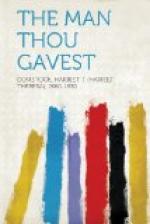The man had done much good work before, but nothing remarkable; he had taken his years of labour with patient courage, insisting that they were but preparation. He had half starved in the beginning—had gradually made his way to what every one believed was a mediocre standstill; but he kept his faith and his cheerful outlook, and then—he quietly presented the remarkable figure that demanded recognition and appreciation.
The artist had sold his masterpiece for a sum that might reasonably have caused some excitement in his life—but it had not!
“I’m sorry I let the thing go,” he confided to a chosen few; “come and help me bid it good-bye.”
Lynda and Conning were among the chosen, and upon the afternoon of their call they happened to be alone with him in the studio.
All other pieces of work had been put away; the figure, in the best possible light, stood alone; and the master, in the most impersonal way, stood guard over it with reverent touch and hushed voice.
Had his attitude been a pose it would have been ridiculous; but it was so detached, so sincere, so absolutely humble, that it rose to the height of dignified simplicity.
“Thornton, where did you get your inspiration—your model?” Truedale asked, after the beauty of the thing had sunk into his heart.
“In the clay. Such things are always in the clay,” was the quiet reply.
Lynda was deeply moved, not only by the statue, but by its creator. “Tell us, please,” she said earnestly, “just what you mean. I think it will help us to understand.”
Thornton gave a nervous laugh. He was a shy, retiring man but he thought now only of this thing he had been permitted to portray.
“I always”—he began hesitatingly—“take my plaster in big lumps, squeeze it haphazard, and then sit and look at it. After that, it is a mere matter of choice and labour and—determination. When this”—he raised his calm eyes to the figure—“came to me—in the clay—I saw it as plainly as I see it now. I couldn’t forget, or, if I did, I began again. Sometimes, I confess, I got weird results as I worked; once, after three days of toil, a—a devil was evolved. It wasn’t bad, either, I almost decided to—to keep it; but soon again I caught a glimpse of the vision, always lurking close. So I pinched and smoothed off and added to, and, in the end, the vision stayed. It was in the clay—everything is, with me. If I cannot see it there, I might as well give up.”
“Thornton, that’s why you never lost courage!” Truedale exclaimed.
“Yes, that’s the reason, old man.”
Lynda came close. “Thank you,” she said with deep feeling in her voice, “I do understand; I thought I would if you explained, and—I think your method is—Godlike!”
Thornton flushed and laughed. “Hardly that,” he returned, “it’s merely my way and I have to take it.”
It was late summer when Truedale completed the play. Lynda and the children were away; the city was hot and comparatively empty. It was a time when no manager wanted to look at manuscripts, but if one was forced upon him, he would have more leisure to examine it than he would have later on.




